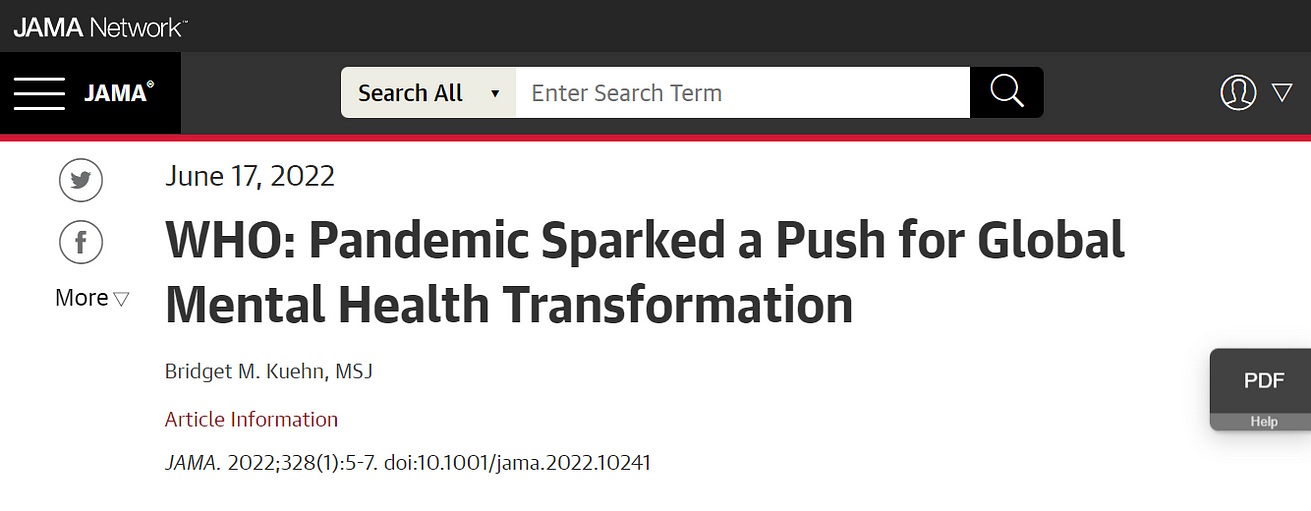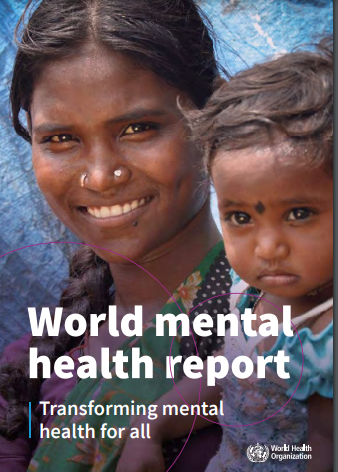JAMA Network
Bridget M. Kuehn, MSJ
June 17, 2022
Key points by
Joaquim Cardoso MSc.
Health Transformation — Institute
Mental Health Unit
July 9, 2022
- About 1 in 8 people worldwide — nearly 1 billion — live with a mental health disorder, according to the report.
- Suicide accounts for 1 in every 100 deaths and is a leading cause of adolescent death.
- Yet on average, governments spend just 2% of their health budgets on mental health care, and low- and middle-income countries spend just 1%.
- Roughly half the world’s population lives in a country with 1 psychiatrist for 200 000 or more people.
- The report notes that child and adolescent mental health specialists in many low- and middle-income countries are “almost non-existent.”
- As a result, most people living with mental illness do not get care, according to the report.
- As a result, mental illness is a leading cause of disability worldwide, exacting an enormous financial toll.
- The World Economic Forum has estimated that mental health conditions cost $2.5 trillion in 2010 and predicted that costs will rise to $6 trillion by 2030.
Structure of the publication:
- Introduction
- Global Crisis
- Why Now?
- Voice, Choice, and Influence
- No Mental Hospital Needed
ORIGINAL PUBLICATION (full version)

Introduction
It took 11 years, but Sahar Vasquez of Belize now considers an illness she once called her “bubble of shame” to be a superpower she uses to help others. “I spent years living with an undiagnosed mental illness,” Vasquez wrote in the new global mental health report from the World Health Organization (WHO) — its first in more than 20 years.
After starting treatment with prescription medication and therapy sessions, she went on to cofound a nonprofit organization that spreads awareness and breaks down stigma about mental illness.
Giving people hope by sharing my story has been the greatest pleasure of my life,” Vasquez wrote.
Her story is among dozens of firsthand accounts woven throughout the WHO’s World Mental Health Report: Transforming Mental Health for All.

The document leverages these stories to build a case for transforming global mental health care delivery to create seamless human rights– and community-based prevention and mental health care systems.
The report aims to capitalize on the growing recognition of mental health’s importance amid a global pandemic, which disrupted care.
During COVID-19’s first year, the prevalence of anxiety and depression rose by about 25%, the report notes.
“Interest in mental health is higher than it has ever been because of COVID-19,” Mark van Ommeren, PhD, head of the mental health unit in the WHO’s Department of Mental Health and Substance Use in Geneva, Switzerland, said in an interview.
During COVID-19’s first year, the prevalence of anxiety and depression rose by about 25%, the report notes.

Global Crisis
About 1 in 8 people worldwide — nearly 1 billion — live with a mental health disorder, according to the report.
Suicide accounts for 1 in every 100 deaths and is a leading cause of adolescent death.
Yet on average, governments spend just 2% of their health budgets on mental health care, and low- and middle-income countries spend just 1%.
Roughly half the world’s population lives in a country with 1 psychiatrist for 200 000 or more people.
The report notes that child and adolescent mental health specialists in many low- and middle-income countries are “almost non-existent.”
As a result, most people living with mental illness do not get care, according to the report. For example, 71% of individuals with psychosis go untreated. In many low- and middle-income countries, essential psychotropic drugs are often unavailable or unaffordable.
As a result, mental illness is a leading cause of disability worldwide, exacting an enormous financial toll.
The World Economic Forum has estimated that mental health conditions cost $2.5 trillion in 2010 and predicted that costs will rise to $6 trillion by 2030.
The World Economic Forum has estimated that mental health conditions cost $2.5 trillion in 2010 and predicted that costs will rise to $6 trillion by 2030.
Many people living with mental health conditions face human rights violations.
They often encounter discrimination, are excluded from community life and work, face physical or sexual abuse, may be denied the right to food and shelter, and are prohibited from voting or marrying, according to the report.
Care in many countries is concentrated in long-term psychiatric hospitals, the report notes.
Many people report human rights violations in these settings, where residents are often held against their will and may experience overcrowding, unsanitary conditions, or inadequate nourishment.
“Too many people encounter human rights abuses by the services that are supposed to [help] them,” van Ommeren said.
“Almost every country in the world has failed [to provide mental health care] in comparison to physical health care, regardless of how much they spend and how many psychiatrists, psychologists, and psychiatric facilities they have,” Vikram Patel, MBBS, PhD, the Pershing Square Professor of Global Health at Harvard Medical School, said in an interview.
“There is really a need to question the fundamental assumptions that have been at the heart of mental health care,” said Patel, who served as an advisor on the report.
He explained that reassessing the nature of mental health and the biomedical approaches used to diagnose and treat it as well as determining who can provide care are critical issues.
“There is really a need to question the fundamental assumptions that have been at the heart of mental health care,” said Patel,
… reassessing the nature of mental health and the biomedical approaches used to diagnose and treat it as well as determining who can provide care are critical issues.

Why Now?
The new report is just the latest attempt by the WHO to catalyze global action to improve mental health care.
The organization released its first World Mental Health report in 2001 and a comprehensive mental health action plan in 2013.
The action plan emphasized shifting care away from long-term inpatient settings toward community-based approaches integrated with primary care.
It also promoted more prevention, information-tracking systems, and a doubling of mental health research.
However, global progress toward implementing the action plan has been slow, resulting in a deadline extension from 2020 to 2030.
The WHO’s 2020 Mental Health Atlas found that only about half of WHO member states had aligned their mental health policies with global human rights rules or had the recommended national mental health prevention programs in place.
Only about 1 in 4 had integrated mental health in primary care. Fewer than 1 in 5 had mental health awareness or stigma prevention plans.
But a confluence of circumstances may be creating conditions ripe for change, van Ommeren said, including urgency created by COVID-19.
A growing body of evidence supports the importance of a “continuum of mental health,” van Ommeren said.
The report notes that mental health is fluid; it changes during people’s lives as they encounter shifting situations and stressors.
Countries that were most severely affected by COVID-19 had the greatest increases in depressive disorders and anxiety disorders, according to the report.
Countries that were most severely affected by COVID-19 had the greatest increases in depressive disorders and anxiety disorders, according to the report.
“The pandemic has foregrounded the importance of population mental health,” Patel added. “There is a lot of political will and civil society demand.”

Voice, Choice, and Influence
People who have lived with mental illness have valuable insights to share on improving mental health care and tackling stigma, even among policy makers who may harbor it, van Ommeren said.
Among those who gave firsthand accounts in the WHO report of how they cope with mental illness is Charlene Sunkel of South Africa.
Despite periodic adverse effects from medication or other problems related to her schizophrenia diagnosis, Sunkel founded and is chief executive officer of the Global Mental Health Peer Network, an organization of people living with mental health disorders who share their experiences with and advocate for others with mental illness.
Leading the peer network, she wrote, has been “one of the key elements that has contributed to my mental health and well-being.”
In an interview, Sunkel said that sharing stories serves to “highlight the realities we experience, good or bad, as evidence of what works and what doesn’t.
But we play a much larger role in using our experiences to offer solutions and collaborate with all stakeholders as key partners in conceptualizing better, more effective, and dignified approaches to mental health care.”
The report’s authors agree. People who live with mental illness, they wrote, give “voice, choice and influence” to the mental health care system by supporting a “people-centered” approach that respects human rights and values, emphasizes prevention, considers treatment preferences, and coordinates care so that it’s available in the locations where it’s most needed.
“[W]e must reshape the physical, social and economic characteristics of environments — in homes, schools, workplaces and the wider community — to better protect mental health and prevent mental health conditions,” the report states.
“These environments need to give everyone an equal opportunity to thrive and reach the highest attainable level of mental health and well-being.”
“[W]e must reshape the physical, social and economic characteristics of environments — in homes, schools, workplaces and the wider community — to better protect mental health and prevent mental health conditions,” the report states.
“These environments need to give everyone an equal opportunity to thrive and reach the highest attainable level of mental health and well-being.”
To build more supportive systems, governments must work across sectors, van Ommeren said.
Schools and workplaces play a vital role — they can either help or harm mental well-being, according to the report.
Because most mental health conditions have onset by adolescence, bullying, stress, racism, or discrimination in school can have debilitating effects.
But incorporating social and emotional learning in schools can help youths to manage stress, be mindful of what’s going on around them, learn problem-solving techniques, build positive relationships, and articulate their views clearly and respectfully.
Schools can also be a vital resource to help parents provide a supportive home environment.
Laws that limit access to the means used for suicide, such as restricting firearms or toxic chemicals or erecting safety barriers that prevent people from jumping, can also have a sizeable impact.
For example, banning highly hazardous pesticides, which account for one-fifth of suicides globally, helped Sri Lanka cut its annual suicide rate by 70% between 1984 and 2016, according to the report.
Addressing social determinants of health and the role that conflicts and displacement can play in mental health are also emphasized in the report.
Laws that limit access to the means used for suicide, such as restricting firearms or toxic chemicals or erecting safety barriers that prevent people from jumping, can also have a sizeable impact.
Addressing social determinants of health and the role that conflicts and displacement can play in mental health are also emphasized in the report.
“Shifting mindsets is not always easy; the report challenges conventional perceptions, highlighting that mental health is not isolated within the health sector but rather a common denominator in all aspects of life and a prerequisite for overall well-being and quality of life,” Sunkel said.

No Mental Hospital Needed
When mental health care is necessary, van Ommeren and his colleagues envision seamless integration of services into primary care and general inpatient or outpatient hospital care that’s focused on recovery.
Services would also be available through community-based mental health centers, and at schools, prisons, and social services.
When mental health care is necessary, van Ommeren and his colleagues envision seamless integration of services into primary care and general inpatient or outpatient hospital care that’s focused on recovery.
Services would also be available through community-based mental health centers, and at schools, prisons, and social services.
“An ideal mental health system doesn’t have a mental hospital; there are enough options out there to address a range of needs,” van Ommeren explained.
“An ideal mental health system doesn’t have a mental hospital; there are enough options out there to address a range of needs,” van Ommeren explained.
Psychosocial rehabilitation, small-scale supported living facilities, and financial aid would also be available to those who need more support to reintegrate into their communities.
But shifting toward deinstitutionalization requires careful planning and a gradual scaling up of community-based services, the report notes.
For example, over the past 3 decades, Brazil has gone from spending 75% of its mental health budget on custodial hospitals to about 80% on community care.
The system operates nearly 2700 community mental health centers that are open 24 hours a day, 7 days a week across the country.
Greater use of “task-sharing” approaches, in which mental health specialists train or work with lay people or other clinicians, is also needed to scale up care for common conditions like depression and anxiety.
For example, in Uganda and Zambia, a program called StrongMinds has trained lay workers to provide culturally adapted care for women and adolescents with depression through group sessions.
More than 100 000 people have received treatment from the program over 8 years, and 80% achieve recovery lasting at least 6 months, according to the WHO report.
Greater use of “task-sharing” approaches, in which mental health specialists train or work with lay people or other clinicians, is also needed to scale up care for common conditions like depression and anxiety.
“[Task-sharing has] been happening for decades around the world and across areas of medicine,” Patel said.
He noted that much of the science supporting its use has come from low- and middle-income countries and it has been successfully used for maternal and child health care, HIV care, and in many other contexts.
“What we need to do is embrace this approach for the delivery of psychosocial interventions,” he said.
Technology can also help scale up care.
The United Kingdom’s publicly funded Improving Access to Psychological Therapies program receives more than 1.25 million referrals annually, according to the WHO report.
It first offers guided self-help based on cognitive behavior therapy that’s delivered by telephone.
Participants needing additional help receive higher-intensity care.
The WHO’s online Step-by-Step program provides education and interactive exercises for adults with depression.
A feasibility study showed the program could be culturally adapted to meet the needs of displaced Syrian and Lebanese citizens through 15 minutes of weekly remote guidance from trained laypeople.
Technology can also help scale up care.
The United Kingdom’s publicly funded Improving Access to Psychological Therapies program receives more than 1.25 million referrals annually, according to the WHO report.
Innovative approaches are also needed to train primary care clinicians in mental health care approaches and to boost the numbers of mental health specialists, particularly in low- and middle-income countries.
Some countries use abbreviated training programs, including Bhutan, which created a 4-year undergraduate training program for clinical counselors, and Sri Lanka, which offers 1-year psychiatry degrees for physicians and nurses, the report notes.
Others are building more traditional programs, such as Addis Ababa University in Ethiopia, which partnered with the University of Toronto to create the country’s first psychiatry residency program in 2003. Ethiopia only had 13 psychiatrists at the time, but the program has since trained 100 more.
Patel said countries will likely implement paradigm shifts described in the report according to their own specific needs.
But he said countries that already have a universal health care model rather than a fee-for-service system like in the US may have an advantage in making these changes.
He noted that many countries in western Europe have already made substantial progress. Those with more limited health care systems may also find it easier to adopt.
“It’s easier to build a new house than demolish an existing one and build on its ruins,” he said.
According to Sunkel, all efforts to design, implement, and oversee care should include meaningful, respectful involvement of diverse individuals who have lived experience with mental illness.
She said she hopes their inclusion in crafting the WHO’s report will help governments recognize their valuable expertise.
According to Sunkel, all efforts to design, implement, and oversee care should include meaningful, respectful involvement of diverse individuals who have lived experience with mental illness.
“We are not silent voices; we claimed our right to speak, share our realities, and contribute toward improved mental health care for everyone,” she said.
References and additional information
See the original publication
Originally published at https://jamanetwork.com
NAMES MENTIONED
Mark van Ommeren, PhD, head of the mental health unit in the WHO’s Department of Mental Health and Substance Use in Geneva, Switzerland, said in an interview
Vikram Patel, MBBS, PhD, the Pershing Square Professor of Global Health at Harvard Medical School, said in an interview.












